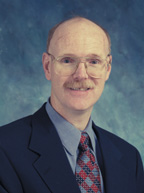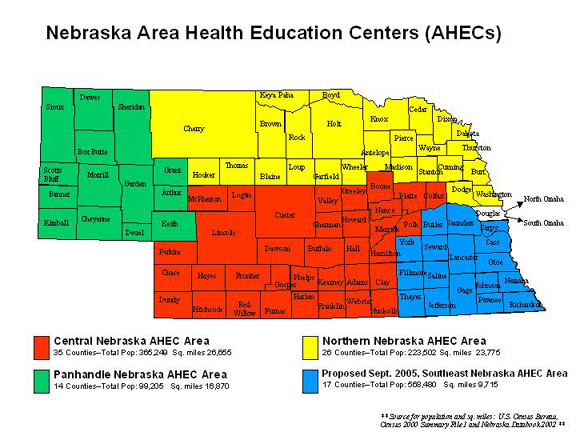 |
Dr. Sitorius |
“Nebraska has received nearly $5 million in AHEC funds over the past four years, which have enabled communities to leverage additional funds for rural health care education needs,” said Michael Sitorius, M.D., chairman of the UNMC Department of Family Medicine and director of the AHEC program in Nebraska.
Dr. Sitorius said that AHECs are multi-institutional, multi-disciplinary, community-based programs that work with community and academic partners to address the primary health care work force needs and health promotion and disease prevention information needs of medically underserved communities.
“We are ecstatic that HRSA has awarded these funds to Nebraska. The AHEC centers across the state have given Nebraska’s health workforce needs and rural economy a tremendous boost,” said Roxanna Jokela, director of Rural Health Education Network and deputy director of the Nebraska AHEC Program Office.
“With more than 75 percent of the AHEC dollars going to the centers and their communities,” said Jokela, “we are confident that AHECS are making a difference for tomorrow’s health professionals.”
 |
Jokela |
With the creation of the Omaha and southeast Nebraska AHECs, all 93 counties across the state of Nebraska will now be served, she said. The AHEC program was introduced in Nebraska in 2001 and is part of the UNMC Rural Health Education Network under which UNMC rural outreach education activities are developed. The Central Nebraska AHEC center in Grand Island serves 35 counties and was the first AHEC to form in 2001. It was followed by the formation of the Northern Nebraska AHEC center, which serves 26 counties, in 2002 in Norfolk and the Panhandle AHEC in 2004. The Panhandle AHEC serves 14 counties and is based in Scottsbluff.
While each AHEC sets its own focus priorities, the primary role of AHECs is the recruitment and retention of health professionals to underserved areas, including a focus on minority recruitment.
AHEC activities include working with local schools (grades K-12) in health career promotion, providing health career fairs and camps, assisting with health profession students to gain education experiences in underserved communities, and working with local health career providers to assure continuing education is available.
“The first three AHEC centers have proven successful and we are excited to bring this program to Douglas County, which has the largest population of underserved people in the state,” said Ward Chambers, M.D., associate professor of cardiology and executive director of Community and Multicultural Affairs at UNMC. The ultimate goal is to recruit more minorities into the health professions, he said.
Today, African Americans, Native Americans and Hispanic Americans make up more than 25 percent of the U.S. population, but represent only 9 percent of nurses, 6 percent of doctors and 5 percent of dentists.
CUMC will use the Omaha Urban AHEC Center as a way to educate its health profession students about the needs of underserved populations by placing them in clinical rotations at community health centers in Omaha and Council Bluffs, said Frank Peak, a Creighton representative. “The goal is to help our students develop insights into the needs of underserved populations and induce them to practice in those communities.
Nebraska congressional representatives Lee Terry and Jeff Fortenberry were pleased to hear the new AHECS will be formed.
“I am pleased that HRSA has chosen to support the expansion of AHEC’s across Nebraska,” Rep. Terry said. “With the newest center located in Omaha, we have a great opportunity before us to help educate minority students about the importance of health care professions. I am also excited that the newest AHEC will have the opportunity to work in collaboration with our outstanding community health centers.”
“Over the past four years, the AHEC program has been extremely successful in addressing the health care workforce needs in Nebraska and exposing students to the importance of careers in the health professions. It’s a program that should pay big dividends for the state when it comes time for these students to choose their future career,” said Rep. Fortenberry, who represents the part of the state that the southeast AHEC will serve.
